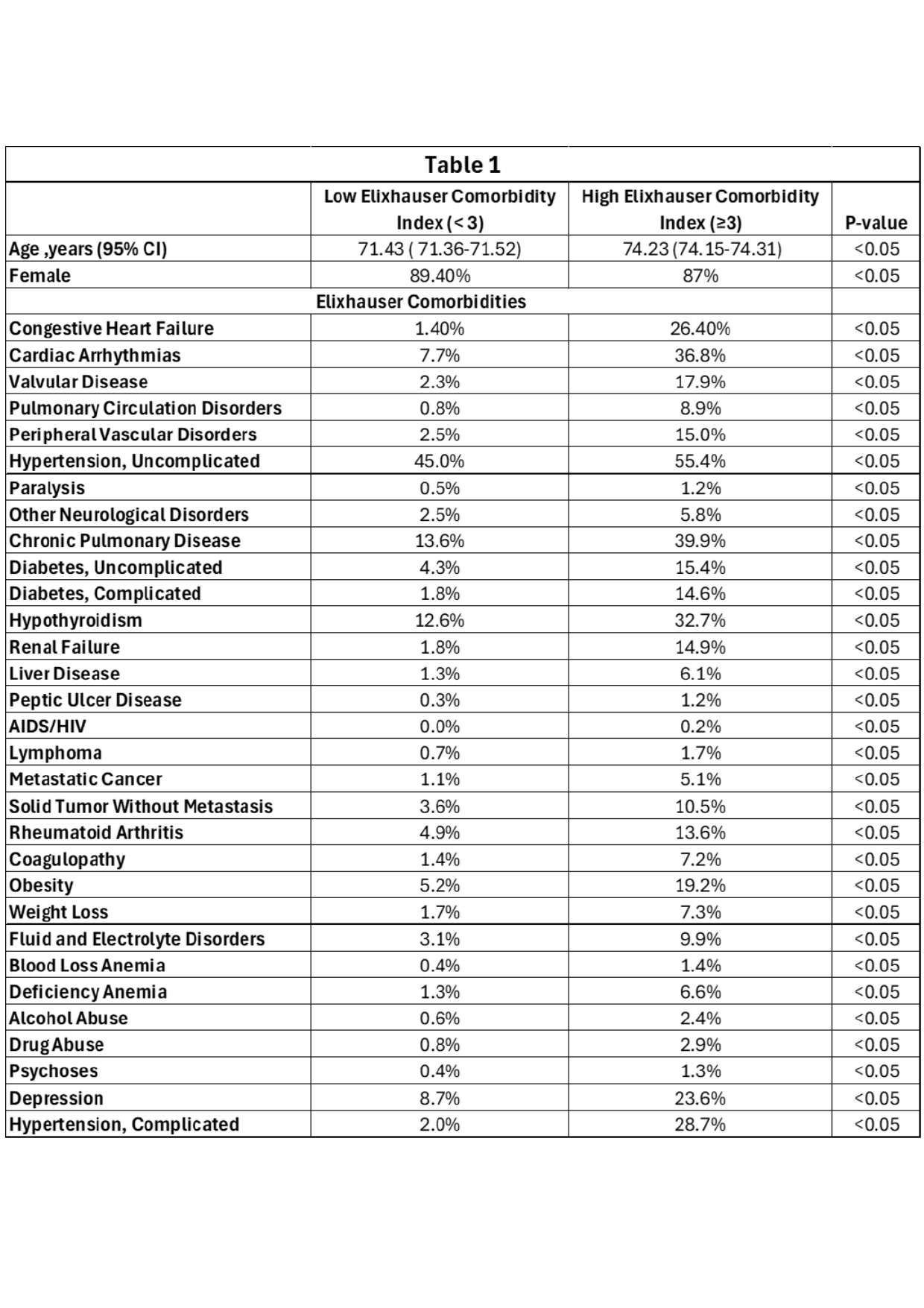Session Information
Date: Sunday, October 26, 2025
Title: (0357–0386) Patient Outcomes, Preferences, & Attitudes Poster I
Session Type: Poster Session A
Session Time: 10:30AM-12:30PM
Background/Purpose: Osteoporosis is a common condition associated with increased morbidity, particularly in older adults. While frailty is a known predictor of adverse outcomes, the independent impact of comorbidities in patients with low frailty is not well defined. This study evaluated the association between the Elixhauser Comorbidity Index and in-hospital mortality among hospitalized osteoporosis patients with low frailty and examined differences in hospital utilization and demographics.
Methods: We conducted a retrospective, survey-weighted analysis using the Nationwide Readmissions Database (2016–2022) to identify hospitalized adult ( >18 years) patients with osteoporosis and low frailty scores (≤5). A total of 1,378,142 patients met inclusion criteria and were categorized by the Elixhauser Comorbidity Index: < 3 vs. ≥3. Multivariable logistic regression, adjusted for sex and weekend admission, was used to evaluate the association between comorbidity burden and in-hospital mortality.
Results: Of the 1,378,142 patients included, 775,034 (56.2%) had a high Elixhauser Comorbidity Index (≥3), of whom 88.0% were female. Table 1 outlines the distribution of individual Elixhauser comorbidities across both groups. In-hospital mortality was significantly higher in the high comorbidity group (0.71% vs. 0.23%; p< 0.001). In adjusted analysis, a higher Elixhauser Comorbidity Index was significantly associated with increased odds of in-hospital death (aOR 1.31; 95% CI: 1.29–1.33; p< 0.001). Patients with greater comorbidity burden had longer hospital stays (3.8 vs. 3.1 days; p< 0.001) and higher mean hospital charges ($61,938 vs. $59,837; p< 0.001) Figure 1.
Conclusion: Among hospitalized osteoporosis patients with low frailty, a higher Elixhauser Comorbidity Index independently predicts greater in-hospital mortality, longer length of stay, and increased hospital costs. These findings emphasize the importance of comorbidity assessment for risk stratification and care planning, even in patients considered low-risk by frailty measures.
To cite this abstract in AMA style:
Bhimani S, Maligireddy A, Bhimani S, Bhatt B, Barjaktarovic N. Hidden Risk in Low Frailty: Impact of Elixhauser Comorbidities on In-Hospital Mortality Among Osteoporosis Patients — A Nationwide Analysis [abstract]. Arthritis Rheumatol. 2025; 77 (suppl 9). https://acrabstracts.org/abstract/hidden-risk-in-low-frailty-impact-of-elixhauser-comorbidities-on-in-hospital-mortality-among-osteoporosis-patients-a-nationwide-analysis/. Accessed .« Back to ACR Convergence 2025
ACR Meeting Abstracts - https://acrabstracts.org/abstract/hidden-risk-in-low-frailty-impact-of-elixhauser-comorbidities-on-in-hospital-mortality-among-osteoporosis-patients-a-nationwide-analysis/


.jpg)